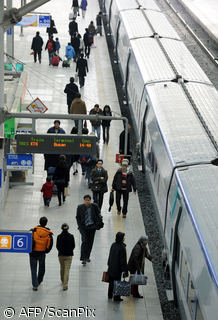Fitch Ratings has revised the Outlook on Estonia's Long-term foreign currency rating to Positive from Stable
Published:
25 October 2003 y., Saturday
Fitch Ratings has revised the Outlook on Estonia's Long-term foreign currency rating to Positive from Stable, the agency said in a press release.
At the same time, Fitch affirmed the Long-term foreign and local currency ratings of Estonia at A- and A+, respectively. The Short-term foreign currency rating was also affirmed at F1. The Outlook on the local currency rating remains Stable.
Estonia's ratings are supported by continuing structural reforms as the country prepares to become a full member of the European Union in May 2004. It is standardizing business practices and legislation at Western European levels, and encouraging foreign investment, the latter of which has contributed to a continuing improvement in the profitability of the corporate and banking sectors. This reform drive has been underpinned by favorable tax rates - particularly on reinvested earnings - and Fitch expects the economy to record strong growth in the region of 5%-7% a year, continuing to raise real per capita incomes, which on a purchasing power basis are already double the level of a decade ago.
Estonia's public finances constitute a considerable support to the ratings. The 2002 budget outcome was much stronger than expected as enhanced tax collection and strong economic activity boosted revenues and the general government sector ran a surplus for the second consecutive year. The country's history of fiscal prudence encourages optimism that the budget will remain broadly in balance, and that the government's tax cutting plans will be countered by strong underlying revenue growth and a cautionary expenditure policy. At 5.3% of GDP, general government debt is already the lowest of any sovereign currently rated in the 'A' range by Fitch and is forecast to fall further. The low borrowing requirement should also continue to support the public sector's strong net external creditor status, which stood at 19% of current external receipts (CXR) by the end of 2002.
Estonia's economic success is reflected by a high level of gross domestic investment, which reached 32% of GDP in 2002. This high investment rate and strong consumer demand have fuelled import growth, causing the current account deficit to more than double last year, while net FDI inflows and reinvested earnings failed to finance the gap for the first time since 1999. Gross external debt increased by nine percentage points of external receipts last year to reach 67% of CXR by end-2002. External bank borrowing undertaken in an effort to compensate for a failure of deposit growth to match that of loans also contributed to an increase in Estonia's net external debt position. Trends over the first half of 2003 indicate that the current account deficit will widen further this year, before starting to narrow from 2004 onwards on the basis of an expected pick-up in external demand. While the government may need to be ready to tighten fiscal policy in the absence of a narrowing of the current account deficit from next year given the limited monetary policy tools at the disposal of the Bank of Estonia, Fitch largely sees recent trends in the current account as a reflection of the present stage of Estonia's successful economic development. External debt ratios remain in line with sovereigns rated in the 'A' range.
Šaltinis:
Interfax
Copying, publishing, announcing any information from the News.lt portal without written permission of News.lt editorial office is prohibited.
The most popular articles
 The mission held constructive discussions with Prime Minister Emmanuel Nadingar, Finance Minister Gata Ngoulou, Infrastructure Minister Adoum Younousmi, and other senior officials.
more »
The mission held constructive discussions with Prime Minister Emmanuel Nadingar, Finance Minister Gata Ngoulou, Infrastructure Minister Adoum Younousmi, and other senior officials.
more »
 The EBRD is helping to improve the quality of power supply and stimulate renewable sources of energy in the Caucasus with an €80 million sovereign loan to Georgia for the construction of a new high voltage transmission line - the Black Sea High Voltage line, which will interconnect Georgia and Turkey.
more »
The EBRD is helping to improve the quality of power supply and stimulate renewable sources of energy in the Caucasus with an €80 million sovereign loan to Georgia for the construction of a new high voltage transmission line - the Black Sea High Voltage line, which will interconnect Georgia and Turkey.
more »
 The EBRD is helping to improve the infrastructure of the Georgian capital, Tbilisi, with a €100 million loan for the construction of a new railway route bypassing the city.
more »
The EBRD is helping to improve the infrastructure of the Georgian capital, Tbilisi, with a €100 million loan for the construction of a new railway route bypassing the city.
more »
 One of the men considered to be the founding fathers of the euro currency met MEPs on the Foreign Affairs Committee Tuesday (16 March) to talk about transatlantic relations.
more »
One of the men considered to be the founding fathers of the euro currency met MEPs on the Foreign Affairs Committee Tuesday (16 March) to talk about transatlantic relations.
more »
 European Trade Commissioner Karel De Gucht today opened a conference focused on the European Union's trade policy towards developing countries.
more »
European Trade Commissioner Karel De Gucht today opened a conference focused on the European Union's trade policy towards developing countries.
more »
 At the beginning of the 2000s, state ownership in financial intermediation in Mexico accounted for about 20 percent of the total credit of the banking system, provided through development financial institutions and funds.
more »
At the beginning of the 2000s, state ownership in financial intermediation in Mexico accounted for about 20 percent of the total credit of the banking system, provided through development financial institutions and funds.
more »
 Halving the number of business failures by offering individual support, doubling the number of young people who want to start their own business or raising by 500% the number of enterprising new cooperatives are just some of the projects nominated for the European Enterprise Awards 2010.
more »
Halving the number of business failures by offering individual support, doubling the number of young people who want to start their own business or raising by 500% the number of enterprising new cooperatives are just some of the projects nominated for the European Enterprise Awards 2010.
more »
 The European Commission has published the fourth call for proposals for the creation and upgrade of freight transport services under the second Marco Polo programme.
more »
The European Commission has published the fourth call for proposals for the creation and upgrade of freight transport services under the second Marco Polo programme.
more »
 The European Central Bank (ECB) today announced a programme of technical cooperation with the Central Bank of Bosnia and Herzegovina, in collaboration with a number of euro area national central banks (NCBs).
more »
The European Central Bank (ECB) today announced a programme of technical cooperation with the Central Bank of Bosnia and Herzegovina, in collaboration with a number of euro area national central banks (NCBs).
more »
 The EU disbursed today €1 billion to Romania, the second instalment of a €5 billion loan, which was agreed in May 2009 as part of a multilateral financial assistance package.
more »
The EU disbursed today €1 billion to Romania, the second instalment of a €5 billion loan, which was agreed in May 2009 as part of a multilateral financial assistance package.
more »